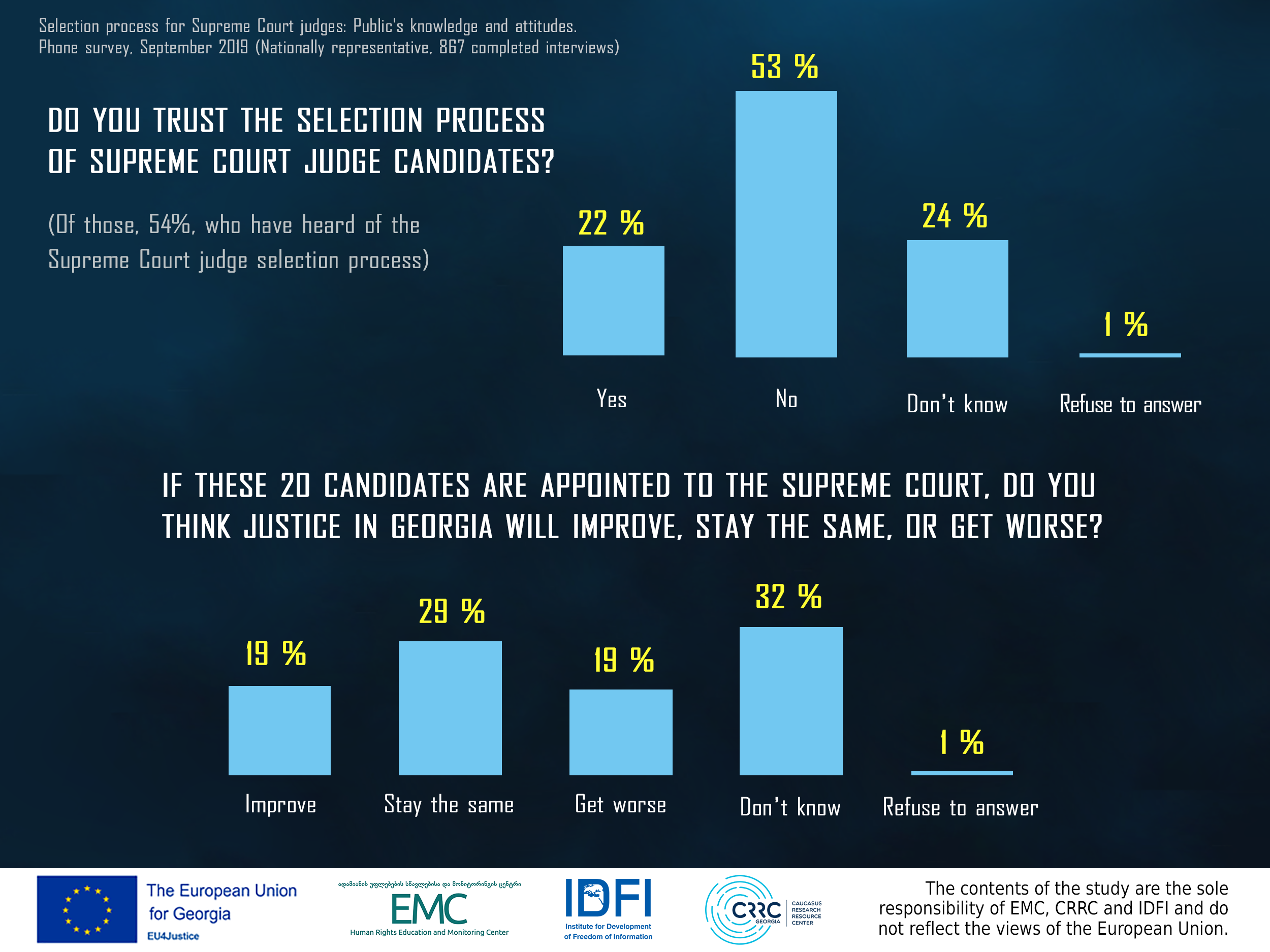Selection of Supreme Court judge candidates: What people in Georgia know and think about the process
The selection process was generally critically received, despite positive assessments of the live-streaming of interviews. The OSCE/ODIHR assessed the Supreme Court judge candidate selection process as “lacking transparency and accountability despite some positive measures to build public trust in the judiciary”. The Coalition for an Independent and Transparency Judiciary was also critical of the process as well as the regulatory framework, which “allowed the formation of a list of candidates suiting the interests of the dominant group of judges and the ruling party”.
What does the public in Georgia know about the process and what is their attitude towards the selection of Supreme Court candidates and judicial institutions? A phone survey conducted on September 5-11, 2019 suggests that people in Georgia are divided in their trust towards judicial institutions, are not knowledgeable about the process, have little trust in it, and largely have not heard of the selected candidates.
Generally, thepublic is divided in whether they trust the High Council of Justice, Supreme Court, and the court system in general. About half of the public trusts and distrusts each of these institutions.

The public is also divided in terms of awareness of the selection process of Supreme Court candidates. Approximately half of the Georgian-speaking adult population (54%) has heard of the selection process of Supreme Court candidates. However, their attitude to it is not particularly positive, as about half of those who have heard about the selection do not trust the process (53%). Similarly, almost half of those who heard about the selection process, say the selection was not unbiased (48%).

The survey asked respondents to share their first association regarding the selection of the Supreme Court candidates. The majority (64%) did not have any association, responding don’t know. Of those who shared their view, there were both positive and negative associations as well as neutral ones. However, negative attitudes predominated. Overall, 3% of respondents reported a positive word, 20%reported a negative association and 10% of responses were neutral. The top three associations were that “appointment should not be lifetime” (6%), “insecurity” (3%), and “distrust” (2%). Positive associations included “hope” (1%), “the process is going in a good direction” (0.6%), and “fair court”. Some of the negative associations were: “negative attitude” (2%), “unfairness” (1%), and “clan” (1%).
After the long selection process, the High Council of Justice finalized the list of 20 candidates to be submitted to the Parliament. The survey asked about whether each candidate should or should not be appointed as a Supreme Court judge. The majority of people in Georgia (over 60% for most candidates) reported that they have not heard of the candidate. Attitudes were most approving of appointment towards: Shalva Tadumadze, Prosecutor General (14% of the population approve of his appointment), Giorgi Mikautadze, Secretary of the High Council of Justice (13% of the population approve of his appointment), and Shota Getsadze, judge of the Tbilisi Court of Appeals (10% of the population approve of his appointment).
About one fifth of the adult Georgian-speaking population (19%) says appointment of these 20 candidates will improve justice in the country. The same share (19%) says the state of justice will get worse. About a third (29%) believe it will stay the same.
Considering the knowledge of the population about the selection process and their attitude to it, it may not be surprising that only 1% of the Georgian-speaking adult population considered it one of the most important events of the summer. [Note: Respondents were not prompted of the events. There was a pre-compiled list for phone operators to mark answers quickly. Several options were added to the list of events after the pilot.] The top five events named during the survey were:
- The devaluation of Georgian Lari,
- Dissolution of the June 20 rally;
- Further moving the administrative boundary line in the Samachablo/South Ossetia region
- The protest rallies “It’s a shame” and;
- Gavrilov’s visit to Parliament.
More than a quarter of people responded “Don’t know” to the question or refused to answer altogether. There were non-relevant answers as well, such as “good weather” and “lack of water and electricity”, etc.
Overall, the public is divided in their trust towards judicial institutions. More than half of the population has heard of the Supreme Court judge selection process, though few find it to be among the most important events over the summer. Among those that are aware of the selection process, attitudes are more negative than positive. A majority of people in Georgia have never heard about the candidates.
Note: This blog post has been produced with the assistance of the European Union. Its contents are the sole responsibility of CRRC-Georgia, EMC and IDFI and do not necessarily reflect the views of the European Union.
On September 5-11, 2019, within the EU-funded project “Facilitating Implementation of Reforms in the Judiciary (FAIR)”, CRRC-Georgia conducted a phone survey to find out people’s knowledge and attitude about the Supreme Court judge selection process. The survey resulted in 867 completed interviews, and is representative of the adult Georgian-speaking population of the country. The average margin of error of the survey is 2.2%.